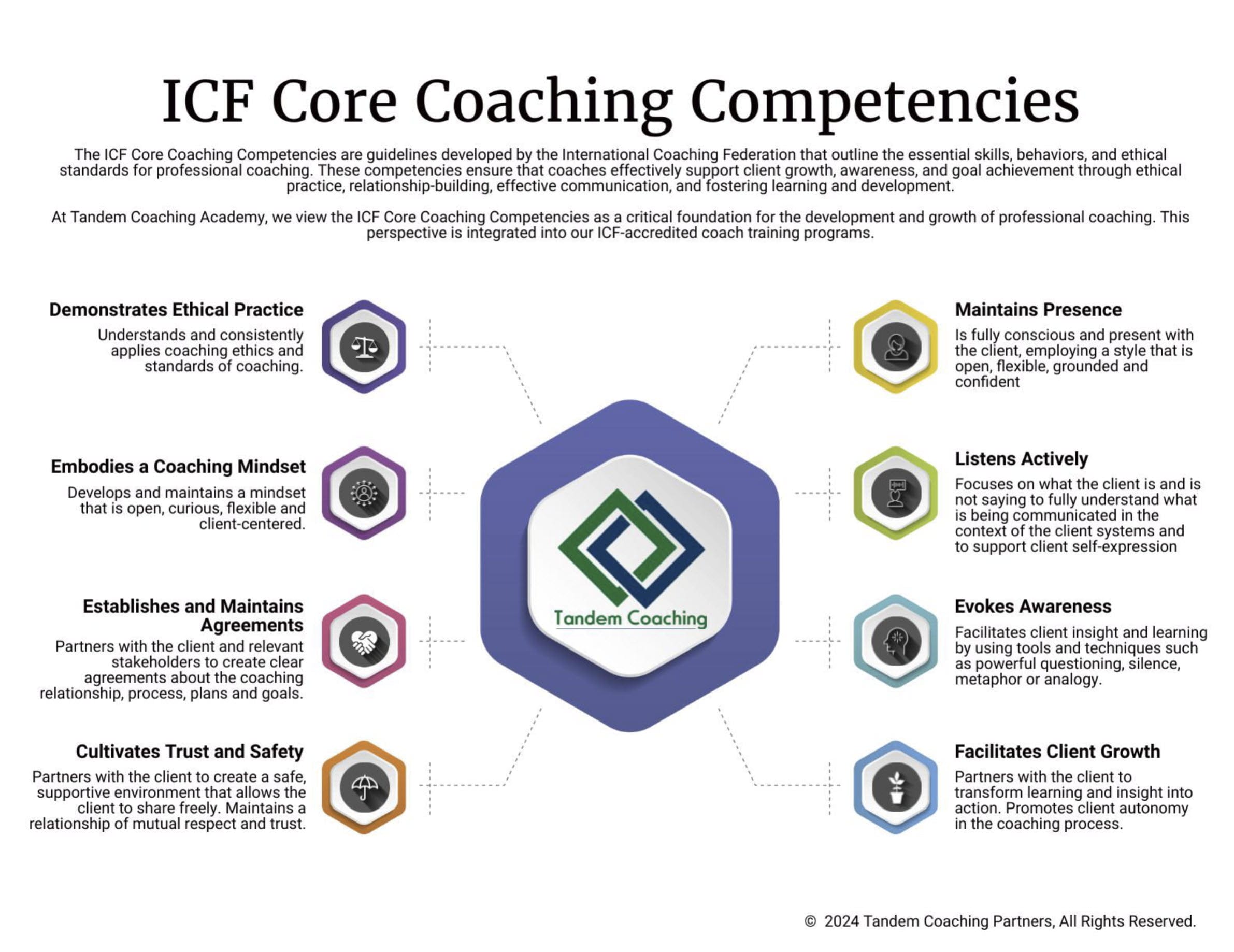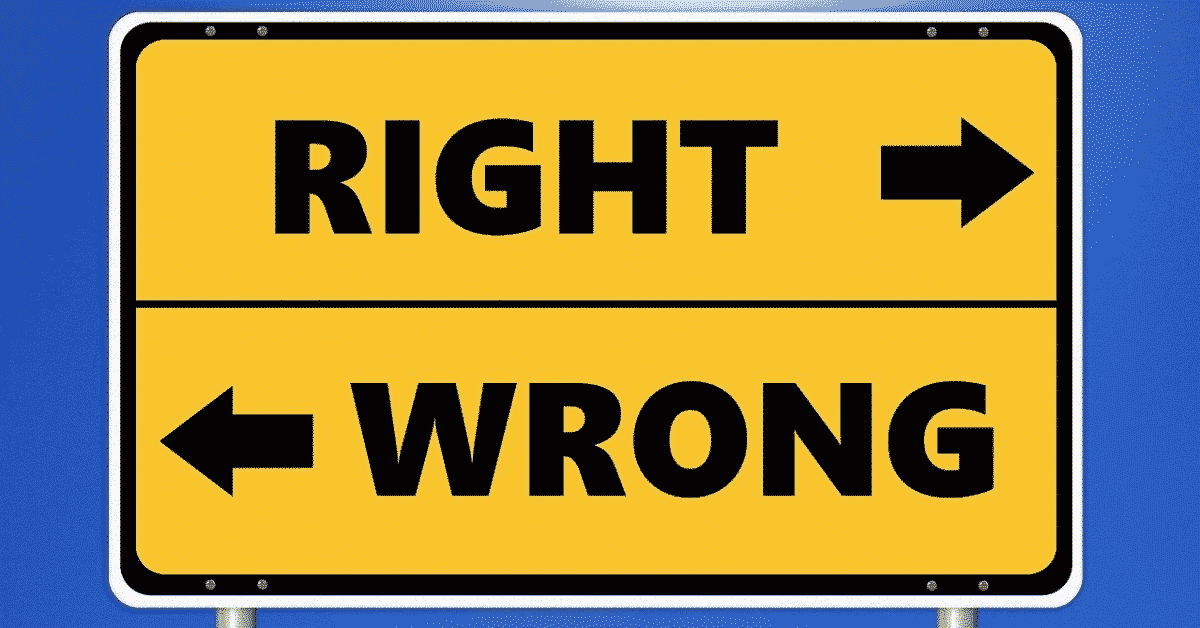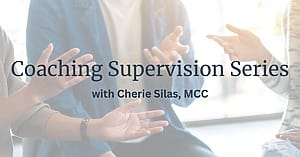If you’ve ever attended an ICF Accredited ACSTH or ACTP program it is likely that you had lots of practice with the ICF Core Competency around Creating the Agreement. At Tandem Coaching Academy, we have found that this is the number one competency that professional coaches struggle with getting right. Why? Because it’s hard. I believe that the reason this is so hard is because while a coaching conversation is supposed to sound like a conversation happening between two people in a strong relationship, it isn’t really that kind of conversation. In your day-to-day conversations, you generally don’t start with questions like, “What is the purpose of our conversation today?” and “What would you like to accomplish in the time we have together?” and “How will you know that we have had a successful conversation?”
Add to that the fact that a coaching relationship isn’t intended to be a close relationship like you have with your friends or loved ones. It’s a professional relationship that maintains a level of intimacy and trust that often exceeds the borders of relationships people have with friends and families, and yet, it’s not intended to extend beyond the borders of professional relationship. Coaching relationships are confidential in nature and the coach and client come together for a specific purpose to achieve specific goals.
I’ve seen many coaches jump into coaching relationships and treat them much like they treated the practice coaching sessions they have with other coaching students. Every conversation is a one-off conversation and there’s no overarching goal for the work they do together. It always surprises me when I do a reciprocal coaching round and work with a coach who doesn’t start out with understanding what the overarching goals for our work will be. Yet, it’s happened to me over and over even with skilled coaches.

Continue Learning with our ICF ACC Level 1 Coach Training Program
ICF core competencies form the foundation of powerful coaching.
Curious about building this strong foundation and embarking on the path to professional coaching?
Our ICF ACC Level 1 coach training program gives you the skills and credentials to excel.
When I work with a coach, it’s important to me that they understand how to manage the coaching relationship and not just the coaching conversation. In fact, I will not hire a coach who doesn’t start the relationship with a clear understanding of what we are focusing on, how we will know we’ve gotten there, and how we will work together in the process. My advice to others is to hold that same level of expectation for coaches you hire because coaches who understand how to hold the entire relationship are more likely to get you to the intended goal than coaches who just view each session as a disconnected event.
I was very excited to see that the International Coach Federation (ICF) updated its Core Coaching Competencies this past year and placed a lot of emphasis on the relationship agreement as a layer of the competency around Creating the Coaching Agreement. They have now publicly recognized that the relationship agreement is just as important, and possibly even more so, than the session agreement.
With that in mind, I created a model for creating the relationship agreement with your client that I have been teaching in our Accredited Coach Training Program – Coaching in Agile Environments for several years. The model has been widely accepted by our students who give me feedback that even a few years after their training program has ended, they are still using the model in their day-to-day work both as internal and external coaches. It is a model that can be used successfully with both individual and team clients and even when the client is a large organization- such as in Agile transformation work.
I developed the STORMMES© model initially to help me in my coaching practice because I needed a consistent way to develop a strong relationship agreement with my clients at the onset of the engagement. I needed something that would help me to ensure that I covered all the important things in the beginning of our relationship that would get us off to a successful start and contribute to achieving the right outcomes by the end of our engagement, I also needed some clearly defined measurements of progress that the client and I could have regular check-ins on to measure progress and adjust overarching goals. The STORMMES© Model provided the structure I needed to work more powerfully with in every coaching engagement.
STORMMES© is an acronym that outlines a list of conversations a coach and client should have when co-creating their relationship. As with using any model, the only way to explain it is in a linear fashion, but it is unlikely that you will use this model in the order presented below. Instead, focus on your client and have the right conversation that covers all these topics in the order that feels the most natural. The best coaches are always responsive to client’s needs above holding tight to using any model as presented for learning purposes.
The conversations held within the acronym STORMMES© are:
S – SUBJECT
Discuss the overall focus of the coaching engagement with your client so you can both understand what the general focus of your work will be. For example, your client may want to focus on improving their overall way of communicating with others because they want to improve the way they are perceived by other higher-ranking leaders in their organization. Clients will often call label this something like confidence, or executive presence. [I often transition out of this conversation into the M-MOTIVATION conversation because they will usually flow well together.]
T – TIMEFRAMES
This conversation, or parts of it may be discussed prior to your client even signing the contract to engage you as their coach and much of this may also be covered in the written coaching contract. The point remains that this conversation must happen whether it is in the initial contact, in the intake session, or during the written contract review. Some of the timeframes that need to be discussed, understood, and agreed to are:
- Engagement length – will this engagement be a number of weeks or months; or, will it be a stated number of sessions?
- Frequency – how often will the sessions occur? Will they happen on a pre-defined cadence and be placed into the calendar as standing appointments or will the client book sessions at a cadence that works for their schedule? How will the client book these sessions? What happens if the client needs to reschedule or cancel a session? What is the cancellation window and what happens if the client misses the window?
- Length – how long are the coaching sessions? If the client is going to be late for the session, will the session be extended to fill the time lost or will it be deducted from the session time? How long with the coach wait for the client before they are considered a no-show? What happens if the client is a no show?
- Progress Check-ins – how often will the coach and client take time to reflect on progress and adjust the goals or relationship agreement? What if the client wants to make a change prior to this outlined time? What if there are concerns about the progress being made? How will conflicts between the coach and client be handled?

Discover ICF PCC and ICF ACTC Team Coaching Competencies and Mastery
Are you eager to magnify the impact of your coaching practice?
Our ICF Team Competencies program offers a seamless transition for those who have mastered the core competencies, allowing you to delve deeper into the complexities and rewards of team coaching.
Explore this opportunity today.
O – OUTCOMES
The outcomes conversation is about what the client ultimately wants as the result of the coaching engagement. These are commonly referred to as the coaching engagement goals. These outcomes often answer the question: What will be different at the end of our coaching engagement if we have been successful in our work together?
R – ROLES
The conversation about roles is a critical part of co-creating the coaching relationship with the client. I often hear coaches I am training, or mentoring tell me that their clients get into engagements with them and what they really want is a consultant. This tells me that the roles conversation needs strengthening. ICF is clear that it is the coach’s responsibility to explain to their clients the difference between coaching and other disciplines and ensure that the client is clear on if they need a coach and not some other helping profession. The coach is responsible for educating the client on what the experience of coaching will be like, so the client understands what they are contracting for. When this isn’t done properly both the coach and the client are likely to be frustrated and disappointed. Some of the things the coach should discuss with the client are listed below; however, this is not an exhaustive list. I recommend that the coach create a checklist of sorts to ensure that they don’t forget any of these items in their initial conversations with the client.
- what to expect of the coaching process
- confidentiality
- adherence to the ICF ethics
- client ownership of their own change and success
- role of coach
- role of client
- how the client can best preparation for sessions
- the importance of reflection after sessions
- the majority of the work must happen between sessions
- legal terms (often in the written contract)
- discussing the most effective ways to communicate with one another for a successful relationship
M – MEASURES
The measures conversation often happens during or after the conversation about outcomes/goals. For each outcome the client wants to achieve through coaching it is important to understand how they will know they have achieved it. These can sometimes be quantifiable measurements like getting the promotion they were working towards or improving their GPA by 20%. Sometimes the client will state measures that are more qualifiable in nature such as I will feel more confident. These squishy measures should be investigated further to understand things like what will be different if you are more confident? How confident are you now? Where do you want to be after our engagement? What is different about your after state than your current state?
This conversation might also outline milestones along the way to the final destination which will help the coach and client see progress along the way and not only at the end of the engagement. This will help them to make shifts and adjustments along the way as necessary.
M – MOTIVATION
The motivation conversation is closely related to both the “SUBJECT” and “OUTCOMES” conversations. This is the “why” behind the client’s reason for engaging a coach. It’s the thing that will keep the client moving forward when things seem stalled or when it gets tough to make progress. The discussion around motivation can take the form of understanding why the goals are important to the client. What value will achieving these goals bring to the client’s life? What will happen if the changes the client wishes to make are not achieved vs what will happen if they are achieved? What is at stake for the client or what opportunity is up for grabs that makes the investment in coaching worth making?
E – ENVIRONMENT
The conversation about environment can give the coach and the client valuable information and insights into the systemic factors that promote and prevent success for the client. What is happening in their environment (professional and personal) that is contributing to the need to achieve these goals? What things in their environment (people, processes, etc.) are available to support them in moving forward? Who are the personal and professional stakeholders that need to be considered or consulted during the engagement? What about their lifestyle or environment might be a hinderance to their success? What can the client or coach leverage to move the client forward?

Enjoyed our insights on professional coaching? We’re just scratching the surface. Dive deeper into the world of transformative coaching with our exclusive offer. Sign up now to receive our FREE brochure: “Our Twelve Favorite Coaching Questions”—a curated collection of powerful questions designed to unlock potential, foster growth, and inspire action.
"*" indicates required fields
S – START
The how to get started conversation is one of prioritization and value assignment. What goals are most important for the client to focus on during the engagement? What is the priority order of the different goals they want to achieve? Which goals can be worked on concurrently and which might need to happen consecutively? How does the client want to approach tacking these goals in the work together? And very importantly, where will we begin?
Coaching engagements are more than just having a series of one-hour conversations with clients who want to talk. Engagements are about getting things accomplished and meeting goals. The client has very real reasons for seeking the assistance of a coach in meeting their goals. This model can be a helpful framework to ensure that your work with the client is set up for the client’s best success. I encourage you to utilize this model in a flexible matter to strengthen the way you co-create your coaching engagements.

Unlock Your Coaching Potential with Tandem!
Dive into the essence of effective coaching with our exclusive brochure, meticulously crafted to help you master the ICF Core Coaching Competencies.
"*" indicates required fields
About the Author
Cherie Silas, MCC
She has over 20 years of experience as a corporate leader and uses that background to partner with business executives and their leadership teams to identify and solve their most challenging people, process, and business problems in measurable ways.















